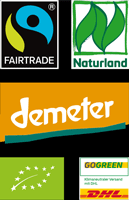- Origin & Cultivation
How fair is fair trade? Part 2.
When I talk to friends about fair trade over a coffee, I’m always told: “It’s too expensive. It’s no good anyway. It’s not transparent.” And so on and so forth. Let’s take a closer look at the main criticisms of fair trade.

Barbara Beiertz
Is the criticism of the Fair Trade seal justified?
Fair trade products are expensive:
True. You pay more for fair trade coffee. How else would the coffee farmer get more? On the other hand, there are also price differences here, which are due, for example, to the quality of the beans, organic cultivation, drum roasting, etc. The next point of criticism, that the “premium prices” do not reach the producers, is based on the misconception that the farmers receive a percentage of the final price. This is not true. The coffee farmers receive a guaranteed minimum price for their beans (which is only limited downwards). And this price is always higher than the market price. This means that they are independent of the fluctuating stock markets, have planning security and can use the premiums paid above this to invest in infrastructure. (see also part 1 of our fair trade series).
The fair trade system is too complicated.
Also true. This is because the principle of “volume balancing” is difficult for consumers to understand.
“In simple terms, manufacturers mix fair and conventional goods so that fair products can also contain “unfair” raw materials and vice versa. However, the producers undertake to buy just as much of the fair raw material as they sell products labeled as “fair” to the customer. However, the quantity purchased fairly does not necessarily have to be physically present (in full) in exactly this package.” (translated from German)*
However, the packaging must also state “with quantity compensation”.
This is actually logical, but we say it anyway to be safe: Coffee is not a mixed product. This means that a Fair Trade-certified coffee like ours is also 100% fair.
Fair trade products from discounters are greenwashing.
That is definitely difficult to say. Fact is, if a product bears the Fair Trade label, it must also have been traded or produced in accordance with fair trade conditions. Of course, this also applies to discounters. The “fair” private labels and seals are therefore only fair in combination with the Fair Trade logo. However, it is also clear that such products only make up a very small part of the discounter range. So, it makes sense to take a closer look and avoid buying the dumping-price bananas that are so nicely displayed next to their Fair Trade counterparts. Fair Trade’s cooperation with discounters may be difficult, but on the other hand it is hardly possible to increase the distribution of fair products without it. True to the motto: every little bit helps…
What alternatives are there to Fair Trade?
In the first part of our fair trade series, we introduced you to the “Naturland” and “Demeter” seals, which are just as trustworthy as Fair Trade.
But what about the well-known “little frog”, the seal of the Rainforest Alliance?
If you look at their website, it says: “Our robust verification system includes checks by independent auditors to be sure the farms that grow these crops, and the companies that source them, are meeting our strict certification requirements—which are all expertly designed to improve farmer incomes and well-being, as well as to regenerate the land.”***
Sounds good. However, a TV report (by the German channel ZDF) in fall 2023 says otherwise:
“The seal often fails to keep its promise. The standards are low, the controls lax. Certified plantations can easily undermine them.” (translated from German) ****. The label has also been repeatedly criticized by Oxfam.*****
The special case of “GEPA”.
GEPA is not a seal or a certification. GEPA is a company that has defined fair trade as its purpose. It was founded in 1975 by the Church Development Service, Misereor, and the newly founded Association of Third World Shops. It is a founding member of today’s World Fair Trade Organization (WFTO) – a global association of Fair Trade organizations. Since 2012, GEPA no longer uses the Fair Trade seal on its products (with a few exceptions) but continues to participate in the control system. The focus is clearly on fairness, but also on organic farming and climate protection. GEPA chocolate & Co. is now not only available in Third World stores, but also in supermarkets. According to the consumer advice center, GEPA’s guidelines are stricter than those of Fair Trade.
And what is the meaning of Direct Trade?
Quite simply: Direct trade between coffee farmers and coffee roasters, for example. Without middlemen. Without a complex supply chain. But it is NOT a registered seal or certification. It is a trading model with a strict voluntary commitment. And this applies to both sides.
Long-term planning, trust, and working at eye level are the basis of this concept, which we implement with our single origin coffees from Peru. They come exclusively from the La Chacra D’dago farm, are Demeter-certified (which is a rarity) and exceptionally diverse in their aromas – a specialty coffee that continues to delight us.
Together with Dagoberto Marin and his family – the coffee farmers – we set the prices for the entire harvest. We pre-finance necessary investments. We develop ideas and plans together so that Demeter cultivation can progress even further. We visit each other on the farm, in the roastery. We are friends. I think you can taste that in our coffees. Respect and fairness have a very special aroma.
If you like to learn more about this special coffee farm, the people, and their work check out this article: Respect – the foundation of extraordinary coffee.
Conclusion: Fair Trade coffee is better.
- Switching to Fair Trade coffee definitely helps. Because it improves the living conditions of the people who grow it. (And that doesn’t just apply to coffee). But: Fair trade is not organic. And Fair Trade is not a sign of quality. So, if you want to drink really good premium coffee then look out for high-quality organic labels such as Naturland or Demeter and gentle, careful roasting in drum roasters.
- You find more information on this topic in this article “Viva la machina”.
- There are strong and weak certifications. Fair Trade and Naturland Fair are the most trustworthy. But even the less stringent seals such as Rainforest Alliance or Utz are better than none at all.
- Direct Trade is an alternative trading model, but not a seal. The model brings higher prices for the producers. And usually very high-quality specialty coffees for the consumers, such as our Single Origin Peru coffee. The most important basis for this is a strict voluntary commitment by farmers and roasters. Unfortunately, the direct trade model has so far only been established in the coffee trade.
In a nutshell: Fair Trade coffee is fair. At least in our case.
Sources:
*www.utopia.de/siegel/fairtrade-siegel-bedeutung-kritik/
***www.rainforest-alliance.org/de/einblicke/was-bedeutet-rainforest-alliance-zertifiziert/
****www.amp.zdf.de/nachrichten/wirtschaft/bananen-verbraucher-pestizide-fair-rainforest-alliance-100.html
*****www.deutschlandfunk.de/nachhaltigkeit-oxfam-wirft-unternehmen-etikettenschwindel-100.html



